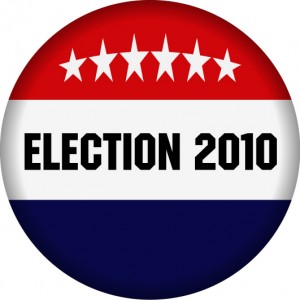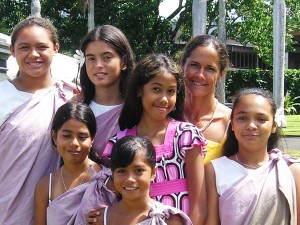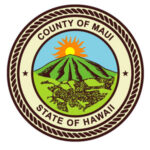Nov 17, 2010 | Innovation
Earlier this month, 27 robotics teams competed in the FIRST Lego League (FLL) 2010 Maui District Tournament. It was a fun, challenging, and exciting event for more than 300 students as well as teachers, advisers, and parents at the Maui High School Gymnasium.
It was just five years ago that MEDB’s Women in Technology program made grants to two Central Maui 4-H robotics teams—the Bunnies and the Ladybugs—to battle it out in the first Maui FLL qualifier in a pilot project funded by the USDA. The Bunnies became the Maui Girls and the 4-H club, with the same leaders, are still going strong, winning the Robot Performance award this month and qualifying for the State FLL Championships next month.
 Since those early days, MEDB has leveraged further funding and resources from USDA, the Department of Education, the Air Force Research Labs (AFRL), and established the Ke Alahele Education Fund to support robotics programs across the County, both by direct funding and provision of equipment and computers. The Ke Alahele Fund is supported, in turn, by many businesses, non-profits, and individuals seeking to develop the STEM skill base of Maui’s students.
Since those early days, MEDB has leveraged further funding and resources from USDA, the Department of Education, the Air Force Research Labs (AFRL), and established the Ke Alahele Education Fund to support robotics programs across the County, both by direct funding and provision of equipment and computers. The Ke Alahele Fund is supported, in turn, by many businesses, non-profits, and individuals seeking to develop the STEM skill base of Maui’s students.
In 2010, MEDB estimates it has already directed approximately $150,000 to robotics programs, events, and training, in support of FIRST Lego League, VEX robotics, Botball, and FIRST robotics.
“The rapid growth in robotics participation and student proficiency is highly gratifying,” observes Leslie Wilkins, Program Director for Women in Technology. “It validates and confirms the importance of our community investment and commitment over the last few years. It bodes very well for our future.”

Nov 11, 2010 | Community
 Elections represent the will of citizens and election year 2010 was no different.
Elections represent the will of citizens and election year 2010 was no different.
Congratulations are due to candidates who will be sworn in to offices in Maui County, the Hawaii State Legislature, the 5th floor of the State Capitol and in Congress, but also to the candidates who offered voters a choice in ideas, philosophy and records.
The results will mean change in the Maui County Council and Hawaii State Legislature, in the Maui mayor’s seat and in the governor’s office. The results also mean change in many state and county departments as new appointees take over as directors and managers.
But if campaign slogans mean anything, there will be no change to perpetuation of core community values espoused by the constituency of Focus Maui Nui.
With the incoming leaders of the State of Hawaii, voters can be assured of attention to quality education as selection of members of the Board of Education is turned over to the new governor under the constitutional amendment approved by voters. Even as they differed on how to achieve the goals, returning incumbents and successful challengers all voiced support for values articulated by the participants of the Focus Maui Nui process: fostering quality education, preserving the Islands’ environmental and cultural resources, promoting targeted economic development and meeting the social and infrastructural needs of the community.
Those values are essential components of a healthy future for Maui Nui. The Focus Maui Nui process will continue to pursue consensus on strategies that provide quality opportunities for the residents of Maui County.
We look forward to the work ahead.

Nov 4, 2010 | Community
 Meeting human needs and preserving local culture are twin core values espoused by our community through the Focus Maui Nui process. Sharon Balidoy, a social worker at Queen Lili`uokalani Children’s Center (QLCC) in Wailuku, is a prime example of a practitioner active on both fronts, making profound contributions to the community.
Meeting human needs and preserving local culture are twin core values espoused by our community through the Focus Maui Nui process. Sharon Balidoy, a social worker at Queen Lili`uokalani Children’s Center (QLCC) in Wailuku, is a prime example of a practitioner active on both fronts, making profound contributions to the community.
QLCC is one of ten units statewide founded by the Queen Lili`uokalani Trust; the trust was founded over a century ago. “The work of the Children’s Center is to offer support and counseling services for Hawaiian orphans and their `ohana,” says Balidoy. “Family strengthening services are also provided to children living apart from their biological parents.”
Central to the mission of QLCC is perpetuation of Hawaiian culture and spirituality, and at the Wailuku Center, this means activities such as crafts, music, dance, and site visits to instill a sense of place. Balidoy estimates that QLCC reaches over a thousand children on Maui. “Our staff consists mostly of social workers working in specific communities, and an important aspect of our work is functioning as an effective team”, says Balidoy.
Balidoy is an expert on teamwork – she is a highly-respected competitive outrigger canoe paddler and helped establish Lae`ula O Kai canoe club almost 20 years ago, based at Kanaha Beach Park in Kahului. “Club members have put a lot of work into Park improvements, observes Balidoy. “Participating in community work days and keeping cultural traditions in mind are cornerstones of the club’s activities.”
Over the years, Balidoy has also been intimately involved in hula – she founded the Hālau Hula Alapa`i I Maluuluolele – “another one of my families,” she chuckles. “I studied under my mother, and for my sister and I, hula was a way of life. Now we both teach. The chants and hula are not about competition or seeking perfection. We practice out of respect for our ancestors and to understand their ways and the places they knew and memorialized.” Balidoy leads classes in Lahaina and Paukukalo.
Oct 30, 2010 | Community
 Just a reminder to everyone to cast your vote, either at your polling place or by absentee.
Just a reminder to everyone to cast your vote, either at your polling place or by absentee.
Voting is an essential part of our democratic process, by which you choose the representatives in your government who make decisions that affect you, your family and your community.
For more information, visit the State of Hawai`i Office of Elections website.
Oct 30, 2010 | Sustainability
 It’s lunchtime, and 18 middle- and high-school students are enjoying the sandwiches they made together on the shaded lanai at Hui Malama Learning Center in Wailuku. The discussion is about local sources of food, the benefits of buying Mauigrown produce. It’s agreed—the food is fresher, it tastes better, and it keeps our own farmers in business. There are minimal transportation costs, which also means fewer harmful environmental effects.
It’s lunchtime, and 18 middle- and high-school students are enjoying the sandwiches they made together on the shaded lanai at Hui Malama Learning Center in Wailuku. The discussion is about local sources of food, the benefits of buying Mauigrown produce. It’s agreed—the food is fresher, it tastes better, and it keeps our own farmers in business. There are minimal transportation costs, which also means fewer harmful environmental effects.
This is one element of Hui Malama’s integrated curriculum, Na Ka `Aina Ke Ola – “From the Land There is Life.” “There are practical benefits of the program,” observes Pualani Enos, Executive Director and science teacher. “Hui Malama serves students with unmet needs; our goal is to engage and empower them and provide the tools they need to succeed in the workforce and as individuals. It’s about instilling confidence, teaching responsible citizenship, and providing the skills they need to be effective contributors in society. They learn they can be agents of change.”
Hui Malama’s program on food and its role in learning about sustainability works on many levels. The students learn about agriculture and visit farms, and they also learn about nutrition and eating right. The program teaches shopping for value and keeping to a budget, and the students are learning to cook for themselves. “At our shared meals, it’s an opportunity to work on table manners, social skills, and group conversation,” says Enos.
This year, the sustainability theme is food and agriculture; next year, the theme will be renewable energy, a hot topic on Maui these days and a likely source of rewarding careers. In addition to its current enrollment of 18 students, Hui Malama currently runs an afternoon GED program for 12 students, a number that will expand to 60 in January 2011.
 Since those early days, MEDB has leveraged further funding and resources from USDA, the Department of Education, the Air Force Research Labs (AFRL), and established the Ke Alahele Education Fund to support robotics programs across the County, both by direct funding and provision of equipment and computers. The Ke Alahele Fund is supported, in turn, by many businesses, non-profits, and individuals seeking to develop the STEM skill base of Maui’s students.
Since those early days, MEDB has leveraged further funding and resources from USDA, the Department of Education, the Air Force Research Labs (AFRL), and established the Ke Alahele Education Fund to support robotics programs across the County, both by direct funding and provision of equipment and computers. The Ke Alahele Fund is supported, in turn, by many businesses, non-profits, and individuals seeking to develop the STEM skill base of Maui’s students.



